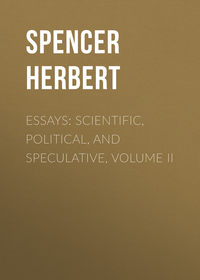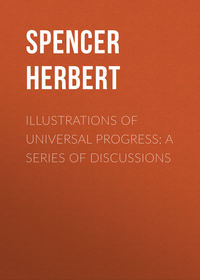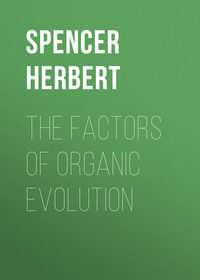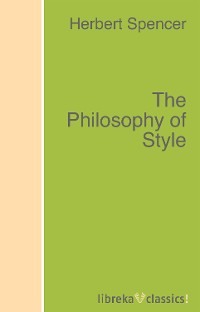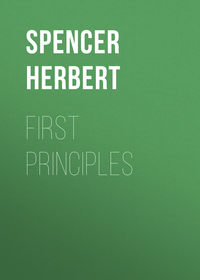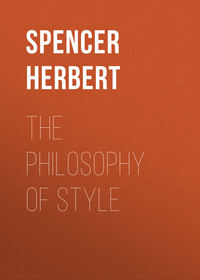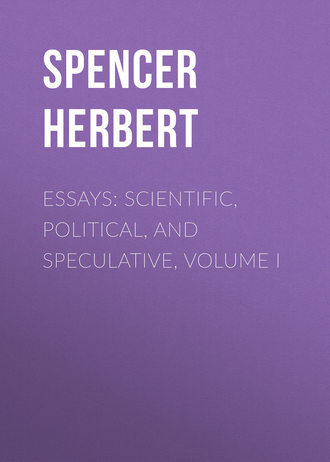 полная версия
полная версияEssays: Scientific, Political, and Speculative, Volume I
This view of the matter, which we believe the established truths of Physiology and Psychology unite in indicating, and which is the view that generalizes the phenomena of habit, of national characteristics, of civilization in its moral aspects, at the same time that it gives us a conception of emotion in its origin and ultimate nature, may be illustrated from the mental modifications undergone by animals. On newly-discovered lands not inhabited by man, birds are so devoid of fear as to allow themselves to be knocked over with sticks; but in the course of generations, they acquire such a dread of man as to fly on his approach; and this dread is manifested by young as well as by old. Now unless this change be ascribed to the killing-off of the less fearful, and the preservation and multiplication of the more fearful, which, considering the comparatively small number killed by man, is an inadequate cause; it must be ascribed to accumulated experiences; and each experience must be held to have a share in producing it. We must conclude that in each bird which escapes with injuries inflicted by man, or is alarmed by the outcries of other members of the flock (gregarious creatures of any intelligence being necessarily more or less sympathetic), there is established an association of ideas between the human aspect and the pains, direct and indirect, suffered from human agency. And we must further conclude that the state of consciousness which impels the bird to take flight, is at first nothing more than an ideal reproduction of those painful impressions which before followed man's approach; that such ideal reproduction becomes more vivid and more massive as the painful experiences, direct or sympathetic, increase; and that thus the emotion in its incipient state, is nothing else than an aggregation of the revived pains before experienced. As, in the course of generations, the young birds of this race begin to display a fear of man before yet they have been injured by him, it is an unavoidable inference that the nervous system of the race has been organically modified by these experiences: we have no choice but to conclude that when a young bird is thus led to fly, it is because the impression produced on its senses by the approaching man, entails, through an incipiently-reflex action, a partial excitement of all those nerves which in its ancestors had been excited under the like conditions; that this partial excitement has its accompanying painful consciousness; and that the vague painful consciousness thus arising, constitutes emotion proper —emotion undecomposable into specific experiences, and therefore seemingly homogeneous.
If such be the explanation of the fact in this case, then it is in all cases. If emotion is so generated here, then it is so generated throughout. We must perforce conclude that the emotional modifications displayed by different nations, and those higher emotions by which civilized are distinguished from savage, are to be accounted for on the same principle. And concluding this, we are led strongly to suspect that the emotions in general have severally thus originated.
Perhaps we have now made sufficiently clear what we mean by the study of the emotions through analysis and development. We have aimed to justify the positions that, without analysis aided by development, there cannot be a true natural history of the emotions; and that a natural history of the emotions based on external characters can be but provisional. We think that Mr. Bain, in confining himself to an account of the emotions as they exist in the adult civilized man, has neglected those classes of facts out of which the science of the matter must chiefly be built. It is true that he has treated of habits as modifying emotions in the individual; but he has not recognized the fact that where conditions render habits persistent in successive generations, such modifications are cumulative: he has not hinted that the modifications produced by habit are emotions in the making. It is true, also, that he occasionally refers to the characteristics of children; but he does not systematically trace the changes through which childhood passes into manhood, as throwing light on the order and genesis of the emotions. It is further true that he here and there refers to national traits in illustration of his subject; but these stand as isolated facts, having no general significance: there is no hint of any relation between them and the national circumstances; while all those many moral contrasts between lower and higher races which throw great light on classification, are passed over. And once more, it is true that many passages of his work, and sometimes, indeed, whole sections of it, are analytical; but his analyses are incidental – they do not underlie his entire scheme, but are here and there added to it. In brief, he has written a Descriptive Psychology, which does not appeal to Comparative Psychology and Analytical Psychology for its leading ideas. And in doing this, he has omitted much that should be included in a natural history of the mind; while to that part of the subject with which he has dealt, he has given a necessarily-imperfect organization.
Even leaving out of view the absence of those methods and criteria on which we have been insisting, it appears to us that meritorious as is Mr. Bain's book in its details, it is defective in some of its leading ideas. The first paragraphs of his first chapter, quite startled us by the strangeness of their definitions – a strangeness which can scarcely be ascribed to laxity of expression. The paragraphs run thus: —
"Mind is comprised under three heads, – Emotion, Volition, and Intellect.
"Emotion is the name here used to comprehend all that is understood by feelings, states of feeling, pleasures, pains, passions, sentiments, affections. Consciousness, and conscious states also for the most part denote modes of emotion, although there is such a thing as the Intellectual consciousness.
"Volition, on the other hand, indicates the great fact that our Pleasures and Pains, which are not the whole of our emotions, prompt to action, or stimulate the active machinery of the living framework to perform such operations as procure the first and abate the last. To withdraw from a scalding heat, and cling to a gentle warmth, are exercises of volition."
The last of these definitions, which we may most conveniently take first, seems to us very faulty. We cannot but feel astonished that Mr. Bain, familiar as he is with the phenomena of reflex action, should have so expressed himself as to include a great part of them along with the phenomena of volition. He seems to be ignoring the discriminations of modern science, and returning to the vague conceptions of the past – nay more, he is comprehending under volition what even the popular speech would hardly bring under it. If you were to blame any one for snatching his foot from the scalding water into which he had inadvertently put it, he would tell you that he could not help it; and his reply would be indorsed by the general experience, that the withdrawal of a limb from contact with something extremely hot, is quite involuntary – that it takes place not only without volition, but in defiance of an effort of will to maintain the contact. How, then, can that be instanced as an example of volition, which occurs even when volition is antagonistic? We are quite aware that it is impossible to draw any absolute line of demarcation between automatic actions and actions which are not automatic. Doubtless we may pass gradually from the purely reflex, through the consensual, to the voluntary. Taking the case Mr. Bain cites, it is manifest that from a heat of such moderate degree that the withdrawal from it is wholly voluntary, we may advance by infinitesimal steps to a heat which compels involuntary withdrawal; and that there is a stage at which the voluntary and involuntary actions are mixed. But the difficulty of absolute discrimination is no reason for neglecting the broad general contrast; any more than it is for confounding light with darkness. If we are to include as examples of volition, all cases in which pleasures and pains "stimulate the active machinery of the living framework to perform such operations as procure the first and abate the last," then we must consider sneezing and coughing as examples of volition; and Mr. Bain surely cannot mean this. Indeed, we must confess ourselves at a loss. On the one hand if he does not mean it, his expression is lax to a degree that surprises us in so careful a writer. On the other hand, if he does mean it, we cannot understand his point of view.
A parallel criticism applies to his definition of Emotion. Here, too, he has departed from the ordinary acceptation of the word; and, as we think, in the wrong direction. Whatever may be the interpretation that is justified by its derivation, the word emotion has come generally to mean that kind of feeling which is not a direct result of any action on the organism; but is either an indirect result of such action, or arises quite apart from such action. It is used to indicate those sentient states which are independently generated in consciousness; as distinguished from those generated in our corporeal framework, and known as sensations. Now this distinction, tacitly made in common speech, is one which Psychology cannot well reject; but one which it must adopt, and to which it must give scientific precision. Mr. Bain, however, appears to ignore any such distinction. Under the term emotion, he includes not only passions, sentiments, affections, but all "feelings, states of feeling, pleasures, pains," – that is, all sensations. This does not appear to be a mere lapse of expression; for when, in the opening sentence, he asserts that "mind is comprised under the three heads – Emotion, Volition, and Intellect," he of necessity implies that sensation is included under one of these heads; and as it cannot be included under volition or intellect, it must be classed with emotion; as it clearly is in the next sentence.
We cannot but think this a retrograde step. Though distinctions which have been established in popular thought and language, are not unfrequently merged in the higher generalizations of science (as, for instance, when crabs and worms are grouped together in the sub-kingdom Annulosa); yet science very generally recognizes the validity of these distinctions, as real though not fundamental. And so in the present case. Such community as analysis discloses between sensation and emotion, must not shut out the broad contrast that exists between them. If there needs a wider word, as there does, to signify any sentient state whatever; then we may fitly adopt for this purpose the word currently so used, namely, "Feeling." And considering as Feelings all that great division of mental states which we do not class as Cognitions, we may then separate this great division into the two orders, Sensations and Emotions.
And here we may, before concluding, briefly indicate the leading outlines of a classification which reduces this distinction to a scientific form, and develops it somewhat further – a classification which, while suggested by certain fundamental traits reached without a very lengthened inquiry, is yet, we believe, in harmony with that disclosed by detailed analysis.
Leaving out of view the Will, which is a simple homogeneous mental state, forming the link between feeling and action, and not admitting of subdivisions; our states of consciousness fall into two great classes – Cognitions and Feelings.
Cognitions, or those modes of mind in which we are occupied with the relations that subsist among our feelings, are divisible into four great sub-classes.
Presentative cognitions; or those in which consciousness is occupied in localizing a sensation impressed on the organism – occupied, that is, with the relation between this presented mental state and those other presented mental states which make up our consciousness of the part affected: as when we cut ourselves.
Presentative-representative cognitions; or those in which consciousness is occupied with the relation between a sensation or group of sensations and the representations of those various other sensations that accompany it in experience. This is what we commonly call perception – an act in which, along with certain impressions presented to consciousness, there arise in consciousness the ideas of certain other impressions ordinarily connected with the presented ones: as when its visible form and colour, lead us to mentally endow an orange with all its other attributes.
Representative cognitions; or those in which consciousness is occupied with the relations among ideas or represented sensations; as in all acts of recollection.
Re-representative cognitions; or those in which the occupation of consciousness is not by representation of special relations that have before been presented to consciousness; but those in which such represented special relations are thought of merely as comprehended in a general relation – those in which the concrete relations once experienced, in so far as they become objects of consciousness at all, are incidentally represented, along with the abstract relation which formulates them. The ideas resulting from this abstraction, do not themselves represent actual experiences; but are symbols which stand for groups of such actual experiences – represent aggregates of representations. And thus they may be called re-representative cognitions. It is clear that the process of re-representation is carried to higher stages, as the thought becomes more abstract.
Feelings, or those modes of mind in which we are occupied, not with the relations subsisting between our sentient states, but with the sentient states themselves, are divisible into four parallel sub-classes.
Presentative feelings, ordinarily called sensations, are those mental states in which, instead of regarding a corporeal impression as of this or that kind, or as located here or there, we contemplate it in itself as pleasure or pain: as when eating.
Presentative-representative feelings, embracing a great part of what we commonly call emotions, are those in which a sensation, or group of sensations, or group of sensations and ideas, arouses a vast aggregation of represented sensations; partly of individual experience, but chiefly deeper than individual experience, and, consequently, indefinite. The emotion of terror may serve as an example. Along with certain impressions made on the eyes or ears, or both, are recalled in consciousness many of the pains to which such impressions have before been the antecedents; and when the relation between such impressions and such pains has been habitual in the race, the definite ideas of such pains which individual experience has given, are accompanied by the indefinite pains that result from inherited effects of experiences – vague feelings which we may call organic representations. In an infant, crying at a strange sight or sound while yet in the nurse's arms, we see these organic representations called into existence in the shape of dim discomfort, to which individual experience has yet given no specific outlines.
Representative feelings, comprehending the ideas of the feelings above classed, when they are called up apart from the appropriate external excitements. As instances of these may be named the feelings with which the descriptive poet writes, and which are aroused in the minds of his readers.
Re-representative feelings, under which head are included those more complex sentient states that are less the direct results of external excitements than the indirect or reflex results of them. The love of property is a feeling of this kind. It is awakened not by the presence of any special object, but by ownable objects at large; and it is not from the mere presence of such object, but from a certain ideal relation to them, that it arises. As before shown (p. 253) it consists, not of the represented advantages of possessing this or that, but of the represented advantages of possession in general – is not made up of certain concrete representations, but of the abstracts of many concrete representations; and so is re-representative. The higher sentiments, as that of justice, are still more completely of this nature. Here the sentient state is compounded out of sentient states that are themselves wholly, or almost wholly, re-representative: it involves representations of those lower emotions which are produced by the possession of property, by freedom of action, etc.; and thus is re-representative in a higher degree.
This classification, here roughly indicated and capable of further expansion, will be found in harmony with the results of detailed analysis aided by development. Whether we trace mental progression through the grades of the animal kingdom, through the grades of mankind, or through the stages of individual growth; it is obvious that the advance, alike in cognitions and feelings, is, and must be, from the presentative to the more and more remotely representative. It is undeniable that intelligence ascends from those simple perceptions in which consciousness is occupied in localizing and classifying sensations, to perceptions more and more compound, to simple reasoning, to reasoning more and more complex and abstract – more and more remote from sensation. And in the evolution of feelings, there is a parallel series of steps. Simple sensations; sensations combined together; sensations combined with represented sensations; represented sensations organized into groups, in which their separate characters are very much merged; representations of these representative groups, in which the original components have become still more vague. In both cases, the progress has necessarily been from the simple and concrete to the complex and abstract; and as with the cognitions, so with the feelings, this must be the basis of classification.
The space here occupied with criticisms on Mr. Bain's work, we might have filled with exposition and eulogy, had we thought this the more important. Though we have freely pointed out what we conceive to be its defects, let it not be inferred that we question its great merits. We repeat that, as a natural history of the mind, we believe it to be the best yet produced. It is a most valuable collection of carefully-elaborated materials. Perhaps we cannot better express our sense of its worth, than by saying that, to those who hereafter give to this branch of Psychology a thoroughly scientific organization, Mr. Bain's book will be indispensable.
THE SOCIAL ORGANISM
[First published in The Westminster Review for January, 1860.]
Sir James Macintosh got great credit for the saying, that "constitutions are not made, but grow." In our day, the most significant thing about this saying is, that it was ever thought so significant. As from the surprise displayed by a man at some familiar fact, you may judge of his general culture; so from the admiration which an age accords to a new thought, its average degree of enlightenment may be inferred. That this apophthegm of Macintosh should have been quoted and requoted as it has, shows how profound has been the ignorance of social science. A small ray of truth has seemed brilliant, as a distant rushlight looks like a star in the surrounding darkness.
Such a conception could not, indeed, fail to be startling when let fall in the midst of a system of thought to which it was utterly alien. Universally in Macintosh's day, things were explained on the hypothesis of manufacture, rather than that of growth; as indeed they are, by the majority, in our own day. It was held that the planets were severally projected round the Sun from the Creator's hand, with just the velocity required to balance the Sun's attraction. The formation of the Earth, the separation of sea from land, the production of animals, were mechanical works from which God rested as a labourer rests. Man was supposed to be moulded after a manner somewhat akin to that in which a modeller makes a clay-figure. And of course, in harmony with such ideas, societies were tacitly assumed to be arranged thus or thus by direct interposition of Providence; or by the regulations of law-makers; or by both.
Yet that societies are not artificially put together, is a truth so manifest, that it seems wonderful men should ever have overlooked it. Perhaps nothing more clearly shows the small value of historical studies, as they have been commonly pursued. You need but to look at the changes going on around, or observe social organization in its leading traits, to see that these are neither supernatural, nor are determined by the wills of individual men, as by implication the older historians teach; but are consequent on general natural causes. The one case of the division of labour suffices to prove this. It has not been by command of any ruler that some men have become manufacturers, while others have remained cultivators of the soil. In Lancashire, millions have devoted themselves to the making of cotton-fabrics; in Yorkshire, another million lives by producing woollens; and the pottery of Staffordshire, the cutlery of Sheffield, the hardware of Birmingham, severally occupy their hundreds of thousands. These are large facts in the structure of English society; but we can ascribe them neither to miracle, nor to legislation. It is not by "the hero as king," any more than by "collective wisdom," that men have been segregated into producers, wholesale distributors, and retail distributors. Our industrial organization, from its main outlines down to its minutest details, has become what it is, not simply without legislative guidance, but, to a considerable extent, in spite of legislative hindrances. It has arisen under the pressure of human wants and resulting activities. While each citizen has been pursuing his individual welfare, and none taking thought about division of labour, or conscious of the need of it, division of labour has yet been ever becoming more complete. It has been doing this slowly and silently: few having observed it until quite modern times. By steps so small, that year after year the industrial arrangements have seemed just what they were before – by changes as insensible as those through which a seed passes into a tree; society has become the complex body of mutually-dependent workers which we now see. And this economic organization, mark, is the all-essential organization. Through the combination thus spontaneously evolved, every citizen is supplied with daily necessaries; while he yields some product or aid to others. That we are severally alive to-day, we owe to the regular working of this combination during the past week; and could it be suddenly abolished, multitudes would be dead before another week ended. If these most conspicuous and vital arrangements of our social structure have arisen not by the devising of any one, but through the individual efforts of citizens to satisfy their own wants; we may be tolerably certain that the less important arrangements have similarly arisen.
"But surely," it will be said, "the social changes directly produced by law, cannot be classed as spontaneous growths. When parliaments or kings order this or that thing to be done, and appoint officials to do it, the process is clearly artificial; and society to this extent becomes a manufacture rather than a growth." No, not even these changes are exceptions, if they be real and permanent changes. The true sources of such changes lie deeper than the acts of legislators. To take first the simplest instance. We all know that the enactments of representative governments ultimately depend on the national will: they may for a time be out of harmony with it, but eventually they must conform to it. And to say that the national will finally determines them, is to say that they result from the average of individual desires; or, in other words – from the average of individual natures. A law so initiated, therefore, really grows out of the popular character. In the case of a Government representing a dominant class, the same thing holds, though not so manifestly. For the very existence of a class monopolizing all power, is due to certain sentiments in the commonalty. Without the feeling of loyalty on the part of retainers, a feudal system could not exist. We see in the protest of the Highlanders against the abolition of heritable jurisdictions, that they preferred that kind of local rule. And if to the popular nature must be ascribed the growth of an irresponsible ruling class; then to the popular nature must be ascribed the social arrangements which that class creates in the pursuit of its own ends. Even where the Government is despotic, the doctrine still holds. The character of the people is, as before, the original source of this political form; and, as we have abundant proof, other forms suddenly created will not act, but rapidly retrograde to the old form. Moreover, such regulations as a despot makes, if really operative, are so because of their fitness to the social state. His acts being very much swayed by general opinion – by precedent, by the feeling of his nobles, his priesthood, his army – are in part immediate results of the national character; and when they are out of harmony with the national character, they are soon practically abrogated. The failure of Cromwell permanently to establish a new social condition, and the rapid revival of suppressed institutions and practices after his death, show how powerless is a monarch to change the type of the society he governs. He may disturb, he may retard, or he may aid the natural process of organization; but the general course of this process is beyond his control. Nay, more than this is true. Those who regard the histories of societies as the histories of their great men, and think that these great men shape the fates of their societies, overlook the truth that such great men are the products of their societies. Without certain antecedents – without a certain average national character, they neither could have been generated nor could have had the culture which formed them. If their society is to some extent re-moulded by them, they were, both before and after birth, moulded by their society – were the results of all those influences which fostered the ancestral character they inherited, and gave their own early bias, their creed, morals, knowledge, aspirations. So that such social changes as are immediately traceable to individuals of unusual power, are still remotely traceable to the social causes which produced these individuals; and hence, from the highest point of view, such social changes also, are parts of the general developmental process.


